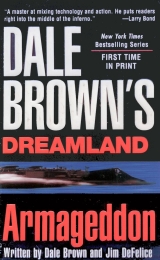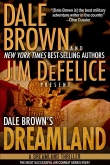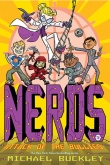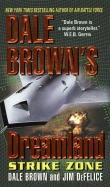
Текст книги "Armageddon"
Автор книги: Dale Brown
Жанр:
Боевики
сообщить о нарушении
Текущая страница: 5 (всего у книги 20 страниц)
Dazhou turned and once more looked at Udara. For a moment, he feared all was lost, and decided he would have his revenge against Udara as well as the terrorist. But then the general spoke very calmly.
“Tell him to proceed on the third day after your arrival.” he told Sahurah. “The third day. Do you understand?”
The messenger might have been insulted—Dazhou surely would have been had the tone been used toward him—but all he did was bow his head.
“Very good,” said Udara, addressing Dazhou. “Let us have some lunch.”
Though he had not planned to stay, Dazhou thought it wise to agree.
Brunei, Office of the Defense Ministry
1100
Mack fought hard to control his temper, knowing from experience that displaying any emotion would only bring smiles to the lips of the others in the room. To a man, the other ministers hated him and would seize on any excuse to stab him in the back somehow.
There were fourteen different ministers and “realm advisors” here, along with members of their staffs, crowded into a conference room that might make a good-sized closet back home. The air-conditioning didn’t work very well, and more than one of the gray faces around the table looked as if it were about to nod off into oblivion. The chief of staff—officially the sultan’s personal counselor for matters of defense—sat at the head of the table, eyes gazing at the ceiling fan. One of the navy ministers was explaining, for the third time, how it was impossible for the ship that sank to have been attacked by a ship.
The minister was speaking in Malaysian. A translator sat behind Mack, whispering the words in English. Everyone in the room could speak English perfectly; Mack suspected that they conducted the meetings in Malaysian simply to emphasize that he was an outsider.
When the navy minister stopped speaking, Mack put up his finger, though he knew from experience that he would not be recognized. Sure enough, the floor went to one of the army people, who began explaining why the Sukhois Mack had encountered did not exist.
That was it. “I’ve had enough,” said Mack, standing up. “Enough”
The translator looked at him, awe-struck. He thought he heard snickers as he walked out the door, but didn’t give them the satisfaction of looking back.
PRINCE BIN AWG WAS SOMEWHAT MORE SYMPATHETIC THAN the ministers, or at least polite.
“The Sukhois have to be dealt with,” Mack told him over lunch at the prince’s palace a few miles from the capital. “It’s possible that they attacked the ship.”
“I think a bomb planted aboard remains the most likely possibility,” said the prince. “It would account for the total destruction. And your aircraft did not detect the attack.”
Mack couldn’t argue with that. It was possible that his crew, only rudimentarily trained, had missed it. But given the course and location of the aircraft when they were detected, it seemed to him unlikely that they were responsible for the attack. But perhaps they were part of a larger attack package, or a reconnaissance flight. In any event, they were still a threat.
“The question in my mind,” said Mack, “is why did Malaysia bring them onto the island secretly? What are they up to? How are the planes equipped?”
“Very good questions,” said the prince. “But you are assuming they are Malaysian. If so, where would they have flown from? I have checked with our sources myself—there are no jet fighters at any of the bases on the island.”
“I think they built a strip near Kalabakan, as part of a highway,” said Mack “I want to fly over it and find out.”
“Kalabakan?”
“That’s my theory,” said Mack. He’d decided it was best not to share the source of his information unless absolutely necessary—the back door might come in handy in the future.
“Flying that far over Malaysian territory—it’s very far. It may be seen as provocative,” said bin Awg.
“I’ll take the Megafortress,” said Mack. “They won’t see us.”
“I don’t know, Mack. I will have to talk to the sultan personally.”
“Okay,” said Mack. “When?”
“Tonight. Or perhaps in the morning. The timing needs to be right.”
“Look, we have to deal with this, and we have to deal with it now,” said Mack. “Even if they didn’t sink that ship, why are they sneaking interceptors onto the island?”
“Perhaps they see the Megafortress as provocative,” offered bin Awg.
Before Mack could respond, the prince raised his hand and signaled to the servant at the far end of the room. The man came over with two bottles of European mineral water, refilling their glasses.
“The Sukhois were older models,” said Mack. “They may have been purchased from Ivana Keptrova”
“No,” said bin Awg.
“No?” said Mack, surprised by how quickly he had responded. “I asked her, and she gave me her word of honor.”
An arms dealer who gave her word of honor—Mack couldn’t decide whether that was quaint or naive. Ivana was a semi-official representative of the Russian government—she claimed to work for the Kremlin but seemed to be under no one’s direct control—and had arranged for several sales of naval equipment to Brunei. She’d also helped bin Awg buy old Cold War hardware and parts. McKenna, who’d worked for her, thought it unlikely she had supplied the Sukhois, but Mack refused to rule it out.
“Maybe we can use this with Washington to get the F-15s,” he said. “Their main argument was that there was no threat, right? Well, with a couple of Su-27s next door, you can shoot that argument down right away”
“The F-15s are going to be denied,” said bin Awg.
Mack felt as if two of the legs of his chair had just been sawed off.
“We have heard unofficially,” added the prince. “The sultan is rethinking our arrangements.”
“Totally denied?” asked Mack.
“We may be able to get F/A-18s. But now there are questions about the fiscal outlay.”
“What do you mean?” asked Mack.
“They are very expensive”
“Are you saying we’re not adding aircraft?”
“Oh, no, no, no, Mr. Minister. I’m not saying that at all. We of course are adding aircraft. Of course. Two more Megafortresses, some interceptors as well, as soon as it can be arranged. But the F/A-18s are not free, and the air force requires a great deal. I’m sure you agree”
“We need planes.”
“Yes,” said bin Awg. “We will get them. Eventually.”
“Eventually better be pretty soon,” said Mack.
“Time moves more slowly in Brunei than in America, Mack. You must learn to relax.”
“I’ll keep that in mind,” said Mack, picking at his lunch.
THERE WERE MORE PROBLEMS TO DEAL WITH WHEN MACK got back to his office in the capital: the maintenance section had used its last spare part for the A-37B radios; the next one that broke would be out of action until replacement parts arrived in six to eight weeks.
“You can’t just cannibalize them?” Mack asked Brown, the officer in charge of the aircraft. “We have four that are stuck in the hangars permanently.”
“We already have,” said Brown.
“What parts are you talking about?” asked McKenna, who’d been standing near the door to Mack’s office waiting to come in to see him.
Brown explained, adding that he had been working on getting the parts ordered for weeks. McKenna waved her hand.
“There’s a shop in Manila where you can get the radios if you want. Frankly, you can upgrade the whole avionics suite for just about the same price,” she said.
Brown stammered something about protocols. McKenna shrugged.
“You have anything else, Brown?” Mack asked.
He shook his head.
“Good. We get the jet fuel’?”
“Working on it.”
“Well, work harder,” said Mack.
Brown nodded, apologized, then left.
“Why don’t we just buy off the civilian suppliers?” asked McKenna.
“Damned if I know,” confessed Mack. “There’s a whole bureaucracy dedicated to making sure I can’t get what I need.”
“The civilian suppliers are cheaper than the fuel Brown’s been getting.”
“How do you know?”
She smiled. “It’s coming through the government, right?”
“Yeah, we have some sort of contract or something.”
“You’re pretty naive, Mack.”
“What do you mean?”
McKenna explained that certain citizens have interests in certain businesses, which the old administration of the air force had been involved with.
“Not crooked, exactly,” she said. “Just a lot of backslapping.”
“So they want to be paid off now, is that it?” Mack asked.
McKenna laughed. “What they want is for you to leave. You’re an outsider, Mack. They want you out of here. They’ll do what they can to make you look bad”
Mack felt his face getting hot. “That’s a pretty dumb game. Dangerous.”
McKenna shrugged. “You can take care of most of them.”
“How?”
“Cut their balls off.”
“Thanks.”
“It’s easier than you think,” she said. She pulled up a chair.
“What do I do?”
“Find another supplier. Then suddenly they’ll have plenty of fuel for sale.”
“You know of one?”
“I might be able to find some fuel, if you’re not too particular about where it comes from.”
“All I’m particular about is if it works.”
“It’ll work.”
“That why you came in?”
“Actually, no. I had an idea on how to flush those Sukhois out, if they’re there.”
“I’m listening”
“Requires practicing some air-to-air refueling between the Dragonflies and EB-52”
“Forget it, then. None of these guys are good enough to fly an A-37 Dragonfly behind the Megafortress. It kicks off some very wicked wind shears. It took a while for the computers to figure out how to do it with a Flighthawk”
“I could do it. If someone who knew what he was doing was flying the Megafortress.”
Mack listened as she detailed the plan. It involved a fly-around of the island by a Megafortress and two escorts two or three days in a row to establish a basic pattern. On the third or fourth day, one of the A-37Bs would pretend to have an air emergency. As it recovered, it would fly close enough to the airstrip to get a good look at it. An aerial reconnaissance pod under one of the wings would snap some pictures and they’d be set.
“That airstrip is eighteen miles inland,” said Mack. “You’re talking about overflying their territorial waters and then running in there—I don’t know. Those planes come up, you’re cooked”
“If you can handle them, I can”
“Too risky.”
“Well, if you’re too chicken—”
“I’m not too chicken,” snapped Mack. Then he smiled at her, and laughed at himself.
A little.
“Don’t do that, McKenna,” he told her. “Don’t try to out-macho me. Okay? Just be straight. No head games. You don’t need them”
She shrugged, not particularly remorseful.
“I’ll take it under advisement,” said Mack. “That it?”
“Breanna Stockard tells me she goes home Tuesday. What are the odds of me doing some time in the pilot’s seat before she leaves?”
“Go for it.”
McKenna smiled, and got up.
“There’s a tanker sailing to the Philippines with some jet fuel that’s supposed to be sold to a private investor there,” said McKenna. “I may be able to find a phone number so you could put in a counter offer.”
“That private investor wouldn’t be your ex-boss, Ivana Keptrova, would it?”
McKenna shrugged. She might not be much to look at, Mack thought, but she was one hell of an operator.
Just the sort of person he needed around here.
“Do it,” said Mack. “Buy it.”
“How much?”
“The whole thing. The ship if you have to. There’s this guy named Chia in the Finance Ministry—”
“That’s Gia,” said McKenna. “Gee-uh.”
“You know him?”
“I’ve heard of him.”
“Yeah. He has this line of credit for us, operating money we can spend, but getting him on the phone is next to impossible so you have to go over there and see him in his office, buttonhole him, you know what I mean? And then on our side there’s Braduski—”
“Bradushi. Like sushi. He’s the guy who cuts the checks for you. I had to talk to him to get paid. He has a mother who needs an operation in Manila.”
“Oh?”
“He was on the phone when 1 came into his office,” said McKenna.
“Well, we can help him, right?” said Mack, catching on. “We make sure we fly her over there, he makes sure we have our fuel.”
She just smiled.
“You just got yourself a raise and a promotion, McKenna,” said Mack. “Air Commodore McKenna, second in command.” She started to laugh.
“Hey, if I’m a minister, second in command can be a commodore,” he told her. “Play your cards right and you’ll be ‘Air Marshal’ at the end of the week. Take that office with the windows down the hall. You want a secretary? Take one of mine. The pretty one”
“No way. She can’t type and she can’t figure out the phone, let alone the computer. I want somebody who can do some work”
“How do you know she can’t type?”
McKenna rolled her eyes. “If I want something good to look at, I’ll get one of those buff boys pulling security in front of the office”
“They’re eighteen years old,” said Mack.
“And?”
“Kick butt, Commodore.”
“I intend to,” she said, marching out.
With McKenna gone and his biggest logistical problem on its way to being solved, Mack began tackling the paperwork, signing his name with abandon. He was about a quarter of the way through the pile when the phone rang. Mack picked up the line quickly, only to find himself speaking to a woman with a thick Russian accent.
“Mr. Minister Smith, good afternoon; I am so glad to have this opportunity to speak to you,” said the woman.
“I didn’t quite catch your name,” said Mack.
“Ivana Keptrova. You have heard of me? I work with friends in the president’s office. The Russian president,” she added.
“Just the person I wanted to speak to,” said Mack.
“And I you. It appears you have hired an employee of mine.”
“Problem?”
“Not a problem perhaps,” said Ivana. “An opportunity maybe. But I would watch her.”
“Oh, I intend on it. Why are you calling?”
“You are in the market for aircraft, are you not?”
“I’m looking for a squadron of F-15s,” said Mack. “You have any?”
“You’re making fun. But if you were more serious, we could speak of the Sukhoi, a very excellent plane,” she said. “With some adjustments here and there, they are twice the plane the Eagle is.”
“Right,” said Mack.
“I can arrange a demonstration.”
“I’ve flown Sukhois,” said Mack.
“Then the sale will be easy”
Mack wondered if the encounter had been meant as a sales demonstration. There was only one way to find out.
“Maybe we can talk in person,” he suggested.
“Of course. How about lunch tomorrow?”
“Lunch?”
“You don’t mind mixing a little pleasure with business, do you Mr. Minister?”
“What time?” he asked.
Washington, D.C.
8 October 1997, 2300
Jed Barclay was almost to the Metro stop when his beeper vibrated. He stopped, hung his head, and without bothering to check the number walked back to his office in the White House basement. He’d learned from experience that, whatever other virtues his boss had—and he did have many—understanding that his aides needed sleep was not one of them.
But it wasn’t Freeman who had called him. It was Mark Stoner, who’d sent a message to the NSC duty officer asking that Jed contact him immediately.
“I think you want to get a look at something that’s going on in Borneo,” said Stoner when Jed reached him at the apartment he was renting outside the city. “I’ve been looking at this all day with some of our guys”
“Borneo? 1 think maybe Fred would be better,” Jed told him, referring to a staffer who handled Southeast Asian matters.
“It may complicate that airplane deal the White House is pushing with Brunei,” said Stoner. “And you have some Dreamland people over there.”
Jed sighed. “Should I meet you at Langley?”
“I’d rather do this at your office,” said Stoner. “And I’m supposed to leave town in the morning. Pretty early.”
“Well, I’m here,” said Jed, pulling off his coat.
Stoner showed up a half-hour later. He had a day and a half’s worth of stubble on his face. Deeply tanned, he’d lost considerable weight since Jed had last seen him. If not quite gaunt, he looked more like a bleached-out castaway than a hardened former SEAL and CIA agent.
“I got an off-the-record phone call the other night from someone in Brunei,” he told Jed, starting right off without even bothering to say hello. “It didn’t make a lot of sense. So I hooked the person up with somebody there I met. And did some checking myself.”
“Okay,” said Jed, not quite following along.
“You have some satellite images from Dreamland’s deployment at Brunei. The images may include the northern part of the island, around on the eastern shore in Malaysian territory, south of Darvel Bay”
Jed turned to his computer and tapped into one of the databases. During the operations in the South China Sea, the U.S. had moved its satellites to provide extensive coverage of the region. They had also conducted surveillance with a variety of systems, gathering electronic signals and other information to compile a profile of activity. But most of the effort had been focused on China and India. America did not yet have the capability of observing every square inch of the globe twenty-four hours a day, seven days a week. Doing so with satellites was not only absurdly expensive but technically unfeasible given present limits in technology. Improvements were steadily being made, but the day when someone could sit in a bunker in Omaha and read license plates around the clock in Beijing—let alone a less important place like Borneo—was still a good way off.
Jed paged through some images, which had been filed as part of a routine series covering the Whiplash deployment. Borneo was a large island shared by three different countries. Brunei territory formed a misshapen W on the northern coast. Sabah, the Malaysian province on the northern part of the island, wrapped itself around Brunei. Below it was the Indonesian territory, Kalimantan.
“What are we looking for?” he asked.
“Piece of road that could be used as an airstrip. About three thousand meters.”
Jed hunted through the images, which mostly showed desolate rock or impenetrable jungle. “This?” he said finally, pointing at what looked like a thickened pencil line near Rataugktan.
“Compare that to an image a year ago,” said Stoner.
The only picture Jed could find was from two years before. The road seemed narrower and ended in a T, which no longer seemed to be there.
“What I think they did was widen and flatten a road that was there, making it into more of a highway. The photo interpreter I talked to says the concrete is pretty new,” said Stoner. “And that what looks like a gully on the northern end there is actually painted on. It’s fairly clever, and if you weren’t looking for it, you might not catch it.”
“So what’s going on?”
“I don’t know,” said Stoner. “But if you can tap into the Russian network and look at their archives, there are two photos that show aircraft on the strip. I came across it by accident when your person called. They were looking for a way to get an image of the island, and I knew someone who would have access to the mirror site that the Greenpeace hackers set up when they broke in a few months ago.”
“Someone?” asked Jed.
“Just someone,” said Stoner. “Private guy. Thrives on information. He probably can get into the Russian system on his own, but I didn’t ask.”
Jed couldn’t get into either the Russian or Greenpeace systems from his computer, since doing so would potentially leave a trail and therefore represent a security breach. He could have any of a number of people do it for him, however.
“What sort of planes?” he asked.
“I’m not sure,” said Stoner. “The interpreter thought they were Sukhois.”
“Breanna Stockard reported that the Brunei air force encountered Sukhois,” said Jed.
“Two plus two,” Stoner deadpanned.
“I could see having a base for counter insurgency there,” said Jed. “The guerillas are operating throughout that entire area. But why would you put interceptors there? Those are pretty useless against terrorists.”
“I don’t know,” said Stoner. “There was a ship that was blown up, right?”
“They’re still investigating. No one thinks it was sunk by a plane.”
“Maybe no one’s right, then,” said Stoner.
Jed turned back to his computer, tapping into SpyNet—the informal name for the intelligence community’s intranet featuring briefings and information from around the world. The CIA was tentatively agreeing with the unofficial Brunei assessment—a terrorist bomb had been planted in the ship.
“This your assessment?” Jed asked.
“No”
“You agree with it?”
Stoner said nothing. Obviously he didn’t, Jed realized—that was his whole point in coming over.
“What about a submarine?” asked Jed.
“Australians keep track of the Malaysian subs, as do the Chinese,” said Stoner. “Very unlikely.”
“Okay,” said Jed. “But why would the Malaysians want to attack a Brunei ship?”
“I don’t know,” said Stoner. “Maybe they’re trying to help the guerillas.”
“Are you still working on this?”
“I’m not working on anything at all,” said Stoner. “I’m being parked.”
“Parked where?”
Stoner made a face that was halfway between a grimace and a smile. “I’m going to be an adjunct history professor at a college up in Poughkeepsie.”
Jed listened as Stoner explained that his supervisors had decided, for his own good, to give him a kind of working vacation, arranging for him to go to the college as part of procedure to build a cover for a future mission. Or at least, that was the story they told him. The reality, as both Jed and Stoner knew without it being laid out, was that the CIA powers had lost confidence in Stoner for some reason, or more likely were preparing to lay the blame for certain agency failures on him. Stoner had been in charge of developing information about several Indian weapons, and had in fact been in the middle of doing that when he nearly got killed from the fallout. At the same time, his section had missed the development of two small tactical nuclear weapons and their delivery system by a private company in Taiwan. It looked to Stoner like the skids were being greased for him to tacitly take the fall. He’d never be accused of screwing up; people would just know he was “parked” and assume the worst.
“Maybe I’m just paranoid,” he said.
“You want to teach history?” asked Jed.
Stoner shrugged.
“Why don’t you come work for us?”
“Let me think about it,” said Stoner. He got up. “Sorry, but I got to work on a lesson plan. I missed the first couple of weeks of class.”
Brunei International Airport, military area, Megafortress hangar
9 October 1997, 1311
Breanna had just finished running through the last simulated flight session of the day when one of the air force liaison officers poked his head up onto the Jersey’s flightdeck.
“Madame Captain,” said the man, “a Mr. Jed Barclay wishes to speak to you without delay.”
While it was the rule rather than the exception, Breanna found the formal politeness an unending source of amusement, and it wasn’t until she reached the phone in the small office at the side of the hangar that she realized it must be one o’clock in the morning back in Washington.
“Jed, what’s up?” she asked.
“I need you to go to a secure phone,” he told her. “Can you get to the embassy? It’s at Teck Guan Plaza in the city.”
“I guess. This about the planes?”
“I’ll call you there in a half-hour.”
“Give me an hour.”
“Okay”
“THEY WERE DEFINITELY SU-27S,” BREANNA TOLD JED WHEN she reached the embassy. “But beyond that I don’t know anything else. They were over Malaysian air space the entire time, and the standing orders for Jersey’s training flights are that they be conducted either over Brunei or over international waters”
“Would an American crew have picked them up if they took off from that airstrip you found?” Jed asked.
“I don’t know. Deci thinks so, but the routines we were running had us pretty low at a couple of points, and I think they would have been missed.”
“Could they have hit the freighter?”
“No way. Just no way. We might not have caught them at the precise moment of attack, but we sure would have seen them earlier. Besides, I doubt they would have returned after an attack. To get back around—no way”
Jed asked her questions about the Brunei air force and the defense ministry in general. It was Breanna’s opinion that, the purchase of the Megafortresses and the hiring of Mack notwithstanding, the Brunei air force remained at best a paper tiger.
“Their attitudes—they’re not very serious,” she explained. “Not even about counter-insurgency. They have trouble getting fuel and supplies. I think that the sultan is trying to turn things around, and certainly Mack is, but there are a lot of other people who are more interested in other things.”
“Yeah, okay,” said Jed. She could hear him stifling a yawn. “What’s going on, do you think?” she asked. “Were the planes and the attack on the merchant ship related?”
“I don’t know. So far it doesn’t fit together. The Malaysians have a pretty serious insurgency problem. Islamic terrorists have been trying to overthrow the government for years. But Brunei hasn’t been targeted by the terrorists, at least not seriously. Their base of operations has been too far away.”
“The people who tried to kidnap Zen and I a few days ago were supposedly terrorists,” said Breanna. “So maybe they’re coming into Brunei now. That incident, the ship—maybe they’re looking for easier targets here.”
“Could be,” said Jed.
“I’m due to leave for Dreamland in a couple of days. You want me to put together a brief on the military situation here when I get back?”
“Be a good idea,” said Jed in between another yawn. “If you come up with anything in the meantime, let me know”
“Will do. Now get some sleep.”
Kota Kinabalu, Malaysia
2011
Sahurah waited for nearly an hour before he was picked up. Two scooters drove up and stopped; the man on the first turned to him and nodded his head. Sahurah took that as the signal to get on and he did so without comment. He held on as the bike whipped through the city streets, turning down alleyways and then doubling back, carefully eliminating any possibility of being followed. Finally it stopped in the middle of a street four blocks from the spot where he had started. As Sahurah slipped off, a battered Toyota drove up behind him. For a moment, Sahurah feared that the government had decided to arrest him.
The window on the car rolled down an inch. “Come,” said the man.
Sahurah walked slowly to the vehicle, opened the door, and got inside. There was another man sitting next to him, middle-aged, someone he had never seen or met before. The car began to move, driving along the narrow road out of town and then climbing up the hill to the cliffside highway. Even at night, the view of the ocean as it spread out north was spectacular, an inspirational hint of God’s expansive universe, but Sahurah did not take the chance to glance toward it.
“What happened?” asked the man.
“The imam is the only one I will address. He instructed me”
Sahurah pressed his fingers together so they would not tremble. Only a few weeks ago he would have felt anger rather than fear at being tested this way. How weak he had grown in such a short time.
The man took a pistol from his pocket. “What if I shoot you?”
That would be a great relief, Sahurah thought to himself. But he said nothing.
The man nodded and put his weapon away. “I was told you were a brave man, brother. I am impressed.”
ROUGHLY AN HOUR LATER, THE CAR PULLED OFF THE shoulder of another road overlooking the sea. Within a few minutes, three cars passed, then two pickups with men in the rear. Finally, a battered black taxi pulled next to them. The imam sat in the back seat; the Saudi visitor sat next to him. Sahurah was told to sit next to the driver, and did so without comment. They drove for a while, taking a dirt road that tucked through the jungle and then doubled back to a promontory over the water. The driver stopped and got out of the car.
“Report now,” said the imam.
Sahurah told him everything that had occurred.
The Saudi murmured something Sahurah could not hear. The imam answered, and then both men were silent.
“You have done very well,” said the imam finally.
He leaned forward. Sahurah felt something press him in the side. He turned and looked down, and saw that there was a small pistol in the imam’s hand.
“Take it,” said the imam.
Sahurah reached across his body with his right hand and took the pistol. It was a small, lightweight gun, a semi-automatic that fit easily in the palm of his hand. It occurred to Sahurah that he might take the gun and hold it to his head.
“Kill yourself,” said the imam.
Surely he had willed his leader to say that.
“Sahurah? Did you hear me?”
“To shoot myself?” he asked. “Will I be denied Paradise?”
“To die as a soldier of jihad is to be made a martyr, if you are under orders,” said the imam. “No matter the circumstances.”
Sahurah knew that suicide was a sin, but he also knew that there were conditions when death was not considered suicide. He had done nothing to prepare himself, however—his body was not clean or properly prepared, and he worried that perhaps he would not find Paradise if he complied.
But he must obey. More importantly, he wanted to. He wanted to be finished with this tiresome, trying world, where he could not cleanse himself of evil thoughts and failures. He wanted to be beyond weakness and lust.
“Are you afraid, Sahurah?” asked the imam.
Sahurah put the gun to his mouth and pulled the trigger. When nothing happened, he realized he had pushed too lightly, and pressed again.
And again.
He felt the imam’s hand on his shoulder. “You are our bravest soldier, Sahurah,” said the imam gently. “Give me back the gun. From this moment on, you are to be honored with the title of Commander. How does that make you feel?”
Sahurah stared at the weapon in his hands. He felt cheated, but he could not say that. A finger of pain began clawing up the back of his neck.
“Your future is the future of us all,” added the Saudi in Arabic. “You will bring great glory to the soldiers of God.”
Dreamland
9 October 1997, (local) 0830
Zen was working now. Sweat poured down his back, drenching his undershirt beneath the flight suit. A crowd of onlookers—including three congressmen and their staffs, along with some Pentagon and army VIPs—were watching from only a few feet away as he worked his Flighthawks through an exercise designed to demonstrate the future direction of aerial warfare. It was an all robot engagement—Lieutenant Kirk “Starship” Andrews and Lieutenant James “Kick” Colby were at the sticks of their own U/MF-3 Flighthawks, trying to keep Zen’s Hawk One and Hawk Two from getting past them on the test range to the northwest. They were doing a reasonably good job of it, too; Kick’s Hawk Three was closing in on Hawk Two, with Star-ship’s Hawk Four right behind. A large flat screen directly behind Zen showed the positions of all of the Flighthawks, and even provided a score as calculated by the computer.








